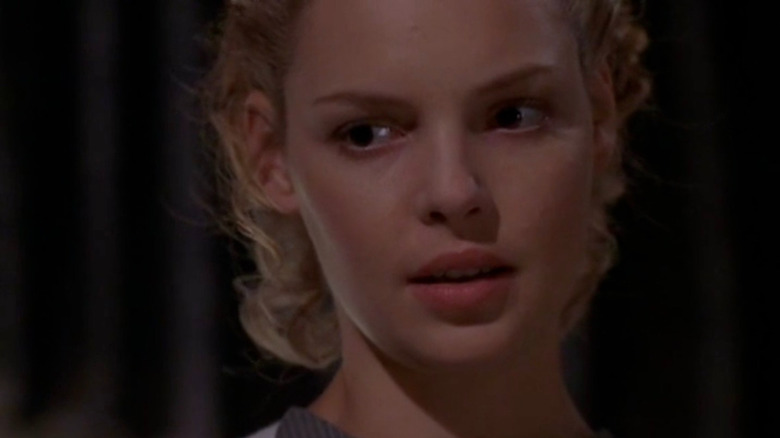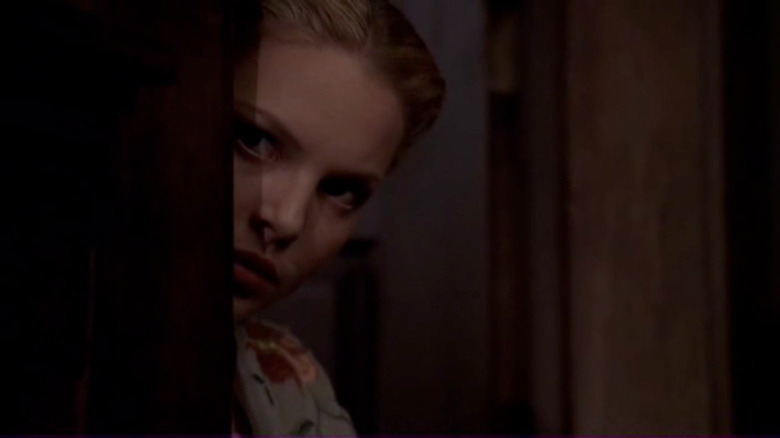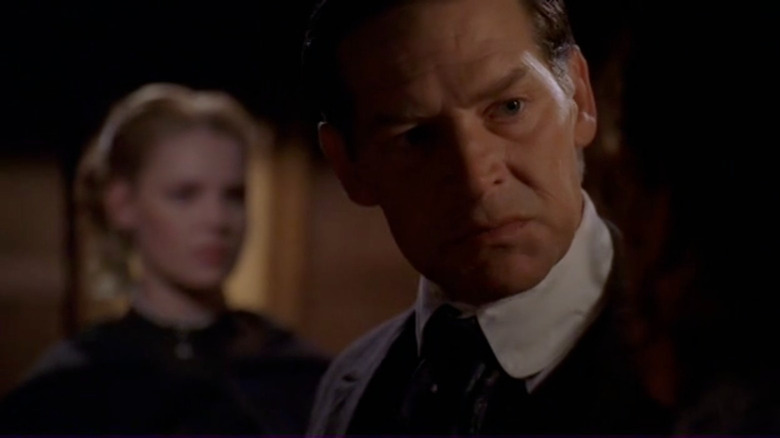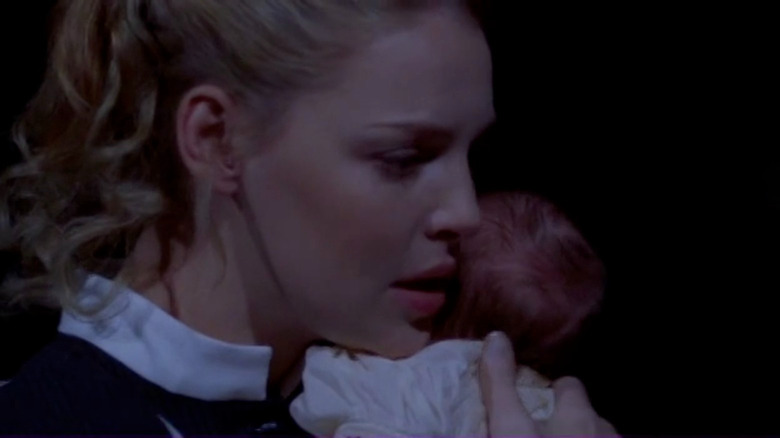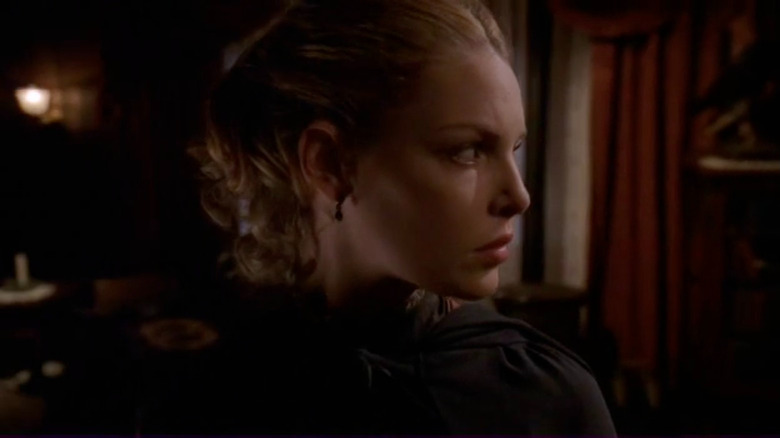Katherine Heigl Tried To Kill Baby Hitler In The Twilight Zone
"The Twilight Zone" isn't any old kind of zone. It's a bizarre place where anything can happen. Aliens can invade at any moment, William Shakespeare can get a job as a Hollywood ghostwriter. Heck, the creator of the series, Rod Serling, even got killed by his own creations once. The limits are only those of the human imagination, which are damn near infinite, except maybe without the words "damn near."
Yes, sometimes "The Twilight Zone" shows us things we never expected to see, which are hard to describe without making it seem like you're the one making it up. This is especially true for the less-popular, but still sometimes great reboots, which in the 1980s, early 2000s, and late 2010s allowed a whole new generation of actors, writers, and filmmakers to play in Rod Serling's unusual sandbox. Unlike the 1960s series, which was a cultural phenomenon in the 1960s and thrived in reruns and streaming services for over half a century afterwards, these stories mostly fell into obscurity, even when they really, really shouldn't have.
Like the one where Katherine Heigl traveled back in time to kill baby Hitler.
Terminator: The Katherine Heigl Chronicles
Oh yes. Katherine Heigl. The Emmy Award-winning co-star of "Grey's Anatomy," the Saturn Award-nominated co-star of "Roswell," and in case you missed it, she also co-starred in the last two seasons of the unexpectedly and retroactively popular "Suits." When the star of hit films like "Knocked Up," "Bride of Chucky," and "Under Siege 2: Dark Territory" wasn't making beloved TV shows and popular films, she was traveling back in time to kill baby Hitler.
The year was 2002 and the "Twilight Zone" episode was called "Cradle of Darkness." It opens with Katherine Heigl as Andrea Collins, who is getting ready to enter a time machine where her assignment is to impersonate a housekeeper, infiltrate the Hitler household, and murder a newborn Adolf Hitler in his crib. It's a literal take on a hypothetical ethical dilemma, wherein a person is asked if they could go back in time and prevent millions of people from dying in the Holocaust by killing Adolf Hitler before he'd actually committed any crimes, would they do it? Would even those ends justify the means?
It's a question that Katherine Heigl's character thinks she knows the answer to, but when she gets to the Hitler household and meets Hitler's philandering father Alois (James Remar, "The Warriors"), his long-suffering mother Klara (Nancy Sivak, "Persepolis"), and their put-upon nanny Kristina (Jillian Fargey, "Murder, She Baked"), her plan gets a little more complicated.
Heigl of Darkness
Despite Andrea's best efforts to do the deed as quickly as possible, the Hitlers won't leave her alone with baby Adolf. Klara is disturbingly superstitious after the deaths of her first three children and insists the baby have a key with it at all times to ward off evil. Meanwhile, Alois, who married his housekeeper Klara after the death of his first wife, is sleeping with Kristina and tries to seduce Andrea too.
When Andrea finally does have the chance to do this ethically complicated deed, she finds it isn't easy. But the clock is ticking and the real housekeeper she impersonated will be there any day. Finally, she abducts baby Adolf Hitler while his parents are distracted at a party, and jumps into a river, killing them both. Kristina, who noticed the child was missing and chased after them, is too late to save baby Hitler, but saves her job by buying another baby from a homeless woman on their street and passing it off as the "real" Hitler.
That means that Andrea didn't stop World War II, and may have inadvertently caused it. Maybe. Kinda. It's a really confusing ending, thematically speaking.
Katherine Heigl and the Dia(bolica)l of Destiny
What exactly are we supposed to take away from "Cradle of Darkness"? In the original "Twilight Zone," Rod Serling would opine at the end of every episode about the events we just witnessed. The classic episode "He's Alive," which told the story of a young white supremacist whose mentor is the ghost of Hitler, concludes with Serling reminding us that "anyplace, everyplace, where there's hate, where there's prejudice, where there's bigotry," Hitler's horrible legacy is kept alive. Its message was very clear.
At the end of "Cradle of Darkness," the UPN series' host Forest Whitaker looks at the camera and says:
A moment of silence for Andrea Collins. She sacrificed her life for the good of mankind. But she also created the very monster she sought to destroy. History can never be changed. Not even in The Twilight Zone.
And that is of no help whatsoever. If anything it just makes the episode more inscrutable.
Die another yesterday
If "Cradle of Darkness" was really about Andrea Collins "creating the very monster she sought to destroy," that means the episode takes a hard stance on its central moral conundrum. It means that the ethically complicated decision to kill Adolf Hitler as a baby was so wrong that it directly led to the deaths of millions of people.
But if Andrea Collins really did "create the very monster she sought to destroy," that means that if she hadn't killed the real Adolf Hitler, then he wouldn't have grown up into history's greatest monster. That means that nature is more important than nurture in this storyline, right? It must have been a fundamentally evil baby who replaced the original.
But that only makes sense if the other baby was destined to commit those atrocities anyway, and according to the show, that wouldn't have happened. The only way history's greatest monster could be created is if it was that baby, specifically, raised in that household. So nurture has to be a factor, except it literally can't be.
In the end, it seems that the only line that really matters at the end of "Cradle of Darkness" is "history can't be changed." If the episode has a point at all, it must be that engaging in morally complicated hypothetical scenarios is meaningless because they have no practical application. You'll never know that far in advance who will become a monster, and even if you did, you wouldn't know exactly how the future (or the past) will ultimately play out.
That's a long way to go just to answer a question by saying "don't ask," and what's worse — what's MUCH worse — is that by arguing that Hitler's atrocities had to happen, and couldn't be changed, "Cradle of Darkness" actively contradicts Serling's message in the original "Twilight Zone," which is that it never should have happened, and must never be repeated.
